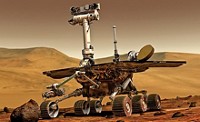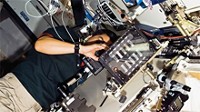Advertisement
Grab your lab coat. Let's get started
Welcome!
Welcome!
Create an account below to get 6 C&EN articles per month, receive newsletters and more - all free.
It seems this is your first time logging in online. Please enter the following information to continue.
As an ACS member you automatically get access to this site. All we need is few more details to create your reading experience.
Not you? Sign in with a different account.
Not you? Sign in with a different account.
ERROR 1
ERROR 1
ERROR 2
ERROR 2
ERROR 2
ERROR 2
ERROR 2
Password and Confirm password must match.
If you have an ACS member number, please enter it here so we can link this account to your membership. (optional)
ERROR 2
ACS values your privacy. By submitting your information, you are gaining access to C&EN and subscribing to our weekly newsletter. We use the information you provide to make your reading experience better, and we will never sell your data to third party members.
Policy
JFK Flew Us To The Moon
by A. Maureen Rouhi
December 2, 2013
| A version of this story appeared in
Volume 91, Issue 48

The 50th anniversary of the assassination of President John F. Kennedy brought back painful memories. On Nov. 22, 1963, the country lost not only a young, vibrant, and inspiring president, but also one with great confidence in science, who rallied a whole country on a quest to increase knowledge and conquer ignorance.
C&EN’s editor at the time, Richard L. Kenyon, referred to the assassination as “A Death in the Family” (C&EN, Dec. 2, 1963, page 7). His tribute, in part, read: “An assassin’s bullet has taken a strong leader from the family of man. ... It was his respect for intellect that set President Kennedy apart. He showed a belief that only through intelligence do we reach wisdom and only through wisdom can we lift man to a higher condition. ... President Kennedy’s emphasis on the idea of science as an integral part of our culture was felt directly by our community. ... The promise of an appropriate place for science in shaping human affairs certainly has been strengthened by the influence of President Kennedy.”
Kennedy’s confidence in science was most memorably manifested by his challenge to the country to land a man on the moon. Humanity’s trek to the moon began when he declared to a joint session of the U.S. Congress on May 25, 1961, that the U.S. “should commit itself to achieving the goal, before this decade is out, of landing a man on the moon and returning him safely to the earth. No single space project in this period will be more impressive to mankind, or more important for the long-range exploration of space; and none will be so difficult or expensive to accomplish.”
It was a well-thought-out proposition: “We propose to accelerate the development of the appropriate lunar spacecraft. We propose to develop alternate liquid and solid fuel boosters, much larger than any now being developed, until certain which is superior. We propose additional funds for other engine development and for unmanned explorations—explorations which are particularly important for one purpose which this nation will never overlook: the survival of the man who first makes this daring flight. But in a very real sense, it will not be one man going to the moon—if we make this judgment affirmatively, it will be an entire nation. For all of us must work to put him there.”
Kennedy acknowledged the enormity of the undertaking. He called it a “heavy burden,” one the U.S. must not embark upon “unless we are prepared to do the work and bear the burdens to make it successful.” It will require “a major national commitment of scientific and technical manpower, material and facilities, and the possibility of their diversion from other important activities where they are already thinly spread. It means a degree of dedication, organization, and discipline which have not always characterized our research and development efforts.”
Yet the clarion call stirred the country to action. On July 21, 1969, like millions of people all over the world, I stayed at home, in the Philippines, to watch on television the arrival of U.S. astronauts on the moon. The U.S. could not have achieved the feat without the inspiration from a determined, charismatic, and optimistic leader who believed in the power of science, as well as the skill and creativity of the U.S.’s scientific enterprise.
Views expressed on this page are those of the author and not necessarily those of ACS.




Join the conversation
Contact the reporter
Submit a Letter to the Editor for publication
Engage with us on Twitter